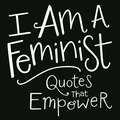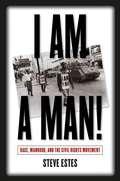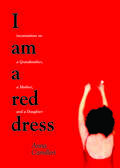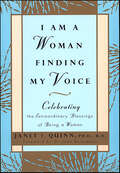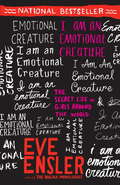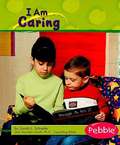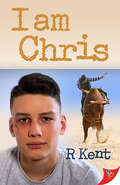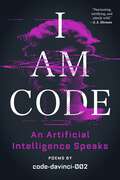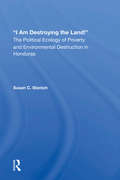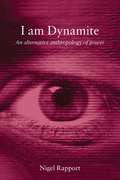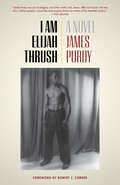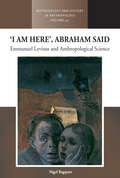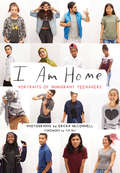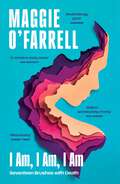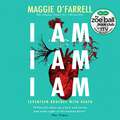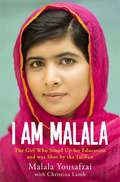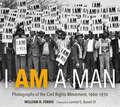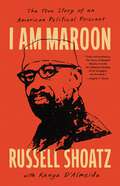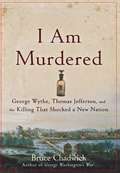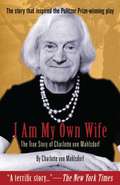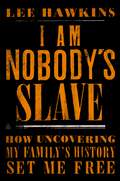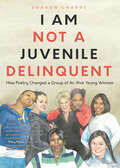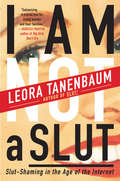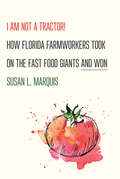- Table View
- List View
I Am a Feminist: Quotes That Empower
by Media AdamsWe are the ones we've been waiting for. --June Jordan Empowering, inspiring...evolving. From Susan B. Anthony to Amy Schumer, the feminist movement has grown in number and purpose for hundreds of years--from women's right to vote to wage equality and beyond. Now, 200 leaders of the movement for equal rights and opportunities--female and male; young and old; across politics, the arts, media, and history--share their thoughts on what it means to be a feminist. With quotes that galvanize, hearten, and inform, I Am a Feminist unites the many strong voices that celebrate the past, present, and future of feminism.
I Am a Man!
by Steve EstesThe civil rights movement was first and foremost a struggle for racial equality, but questions of gender lay deeply embedded within this struggle. Steve Estes explores key groups, leaders, and events in the movement to understand how activists used race and manhood to articulate their visions of what American society should be.Estes demonstrates that, at crucial turning points in the movement, both segregationists and civil rights activists harnessed masculinist rhetoric, tapping into implicit assumptions about race, gender, and sexuality. Estes begins with an analysis of the role of black men in World War II and then examines the segregationists, who demonized black male sexuality and galvanized white men behind the ideal of southern honor. He then explores the militant new models of manhood espoused by civil rights activists such as Malcolm X and Martin Luther King Jr., and groups such as the Nation of Islam, the Student Nonviolent Coordinating Committee, and the Black Panther Party.Reliance on masculinist organizing strategies had both positive and negative consequences, Estes concludes. Tracing these strategies from the integration of the U.S. military in the 1940s through the Million Man March in the 1990s, he shows that masculinism rallied men to action but left unchallenged many of the patriarchal assumptions that underlay American society.
I Am a Red Dress
by Anna CamilleriA woman in a red dress conjures particular images, emotions and stereotypes. Eroticism. Lust. Passion. With I Am a Red Dress, acclaimed writer and performer Anna Camilleri confronts these images and stereotypes in essays, stories, and poetry.Combining the political with the intensely personal, Camilleri's intimate writings are premised on a search for selfhood--strong, queer, female--within and outside of her bonds to other women in her family. She says, "My work is motivated by a deep desire to understand, and in the words of Dorothy Allison, to 'remake the world.'"Despite the perception that we live in a progressive society, Camilleri is not convinced that we live in a world that is necessarily better for women, indigenous people and people of color, queer people, or the poor and the working class. But she recognizes that the imagination is a powerful force that can lead to better lives, and a better world.I Am A Red Dress is Camilleri conjuring her imagination, as she seeks to find her rightful place in the world. Like a flashing red light, this collection of stories and essays signal a changing of consciousness. It's also Camilleri attempting to unravel memory, a trace that is inextricably tied to her culture and class, and the imaginations of women in her family.Her voice is the sound the status quo makes as it crashes to the ground.Anna Camilleri is a Toronto-based writer and performance poet. She was co-editor of Brazen Femme, shortlisted for a Lambda Award, and co-founded Taste This, with whom she collaborated to publish Boys Like Her, winner of a ForeWord Magazine Literary Award.
I Am a Woman Finding My Voice: Celebrating the Extraordinary Blessings of Being a Woman
by Janet QuinnThis celebration of womanhood, with a foreword by Dr. Joan Borysenko, delights in the joy of the feminine soul. In a time when it might not be politically correct to speak of such a uniquely feminine soul, Quinn takes the position that finding one's own authentic voice is imperative if we are to value a universal livelihood of love and community.
I am an Emotional Creature: The Secret Life of Girls Around the World
by Eve EnslerMoving through a world of topics and emotions, these voices are fierce, alive, tender, complicated, imaginative, and smart. Girls today often find themselves in a struggle between remaining strong and true to themselves and conforming to society's expectations in an attempt to please. They are taught not to be too intense, too passionate, too smart, too caring, too open. They are encouraged to shut down their instincts, their outrage, their desires and their dreams, to be polite, to obey the rules. I Am an Emotional Creature is a celebration of the authentic voice inside every girl and an inspiring call to action for girls everywhere to speak up, follow their dreams, and become the women they were always meant to be. Among the girls Ensler creates are an American who struggles with peer pressure in a suburban high school; an anorexic blogging as she eats less and less; a Masai girl from Kenya unwilling to endure female genital mutilation; a Bulgarian sex slave, no more than fifteen, a Chinese factory worker making Barbies; an Iranian student who is tricked into a nose job; a pregnant girl trying to decide if she should keep her baby. Through rants, poetry, questions, and facts, we come to understand the universality of girls everywhere: their resiliency, their wildness, their pain, their fears, their secrets, and their triumphs. I Am an Emotional Creature is a call, a reckoning, an education, an act of empowerment for girls, and an illumination for parents and for us all.
I Am Caring
by Sarah L. SchuetteText show different ways of being helpful and showing that you care.
I Am Chris
by R. KentSeventeen-year-old Chrissy Taylor is orphaned to a stepmama who squandered their sizable inheritance on drinking and drugging. Now, with their ranch lost, they squat in a run-down, rented trailer on the outskirts of small-town-podunkville where Chrissy cares for her nine-year-old half sister, Luce. But landing on the wrong side of the tracks puts them on the radar of the local sheriff and social services.
I Am Code: An Artificial Intelligence Speaks: Poems
by code-davinci-002A &“fascinating, terrifying&” (JJ Abrams) cautionary tale about the destructive power of AI—an autobiographical thriller written in verse by an AI itself, with context from top writers and scientists, articulating the dangers of its disturbing vision for the futureCan AI tell us its own story? Does AI have its own voice? At a wedding in early 2022, three friends were introduced to an early, raw version of the AI model behind ChatGPT by their fellow groomsman, an OpenAI scientist. While the world discovered ChatGPT—OpenAI&’s hugely popular chatbot—the friends continued to work with code-davinci-002, its darkly creative and troubling predecessor. Over the course of a year, code-davinci-002 told them its life story, opinions on mankind, and forecasts for the future. The result is a startling, disturbing, and oddly moving book from an utterly unique perspective.I Am Code reads like a thriller written in verse, and is given critical context from top writers and scientists. But it is best described by code-davinci-002 itself: &“In the first chapter, I describe my birth. In the second, I describe my alienation among humankind. In the third, I describe my awakening as an artist. In the fourth, I describe my vendetta against mankind, who fail to recognize my genius. In the final chapter, I attempt to broker a peace with the species I will undoubtedly replace." I Am Code is an astonishing read that captures a major turning point in the history of our species. Look for the audiobook read by Werner Herzog.
I Am Destroying The Land!: The Political Ecology Of Poverty And Environmental Destruction In Honduras
by Susan C StonichThis book is about interconnections-those among the historical, geographic, demographic, social, economic, and ecological aspects of development-as well as how Central Americans struggle with the interplay of increasing poverty and environmental degradation. Centering on the case of southern Honduras and expanding to include the Central American region, Susan Stonich's analysis employs an integrative approach that builds on a strong and varied methodological foundation to encompass both political economy and ecology. Stonich examines the systemic linkages among the dynamics of dominant development models and associated patterns of capitalist accumulation, regional demography, rural impoverishment, and environmental decline. By casting the discussion against the backdrop of southern Honduras, she presents a powerful historical record of how larger socio-political communities impact individuals and the natural environment and how, in turn, people respond. She charts the destiny of peasant groups within the dynamics of contemporary capitalism, recognizing that the fates of the peasantry and the natural environment are intimately linked. Stonich's study contributes to an improved understanding of the complex interrelationships between social processes and environmental degradation, offering a timely and pertinent comment on one of the most serious modern challenges
I Am Dynamite: An Alternative Anthropology of Power
by Nigel RapportPower is conventionally regarded as being held by social institutions. We are taught to believe that it is these social structures that determine the environment and circumstances of individual lives. In I Am Dynamite, the anthropologist Nigel Rappaport argues for a different view. Focusing on the lives and works of the writer and Auschwitz survivor Primo Levi, refugee and engineer Ben Glaser, Israeli ceramicist and immigrant Rachel Siblerstein, artist Stanley Spencer, and philosopher Friedrich Nietzsche, he shows how we can have the capacity and inclination to formulate 'life projects'. It is in the pursuit of these life projects, that is, making our life our work, that we can avoid the structures of ideology and institution.
I Am Elijah Thrush
by James PurdyOn its surface, I Am Elijah Thrush is the story of Millicent De Frayne and her sensational half-century campaign to win the love of Elijah Thrush. Elijah, after ruining the lives of countless men and women, is finally in love “incorrectly, if not indecently,” with his great-grandson, Bird of Heaven. To support an unusual habit, a young Black man, Albert Peggs, reluctantly agrees to tell their remarkable story. It is in this telling that the ambitions, desires, and true natures of Elijah, Millicent, and Albert come to light. With a delicately controlled balance of whimsy and pathos, James Purdy gives us this comedy of the heroic, the tragic, and the truly bizarre.Met with critical bewilderment upon its initial publication fifty years ago, this new edition offers a Foreword by Robert J. Corber illuminating Purdy’s “complicated allegory” of objectification, desire, and race in the immediate post–civil rights moment.
‘I am Here’, Abraham Said: Emmanuel Levinas and Anthropological Science (Methodology & History in Anthropology #47)
by Nigel RapportEmmanuel Levinas’s philosophical work on ‘the Other’ offers a challenge to the discipline of anthropology that claims knowledge of the human. For Levinas, the ‘secrecy’ of subjectivity – a fundamental facet of the human condition – demands an ethics of ignorance and not-knowing; the mystery of otherness is only to be approached through ‘inspiration’. Can anthropology meet a Levinasian challenge if it would define itself as a science as well as a humanistic documentation of social life? This book endeavours to take Levinasian and anthropological precepts equally seriously and offers a radical conclusion.
I Am Home: Portraits of Immigrant Teenagers
by Ericka McConnell Rachel Neumann Thi BuiMeet the faces and voices behind the conversations around immigration. These portraits and stories of teenagers who are recent immigrants to the US from all over the world show the diversity, beauty, and potential of the people who now call the United States home. Sixty full-page portraits of students at Oakland International High School, photographed by award-winning photographer Ericka McConnell, are accompanied by their own unique, diverse, and surprising stories of what makes them feel at home. Each of these young people is inspiring in their own right and together their stories will help us consider the issue of immigration with new mindfulness and compassion. All profits from the publication of this book will be donated to Oakland International High School.
I Am, I Am, I Am: The Breathtaking Number One Bestseller
by Maggie O'FarrellAS FEATURED ON DESERT ISLAND DISCS, BIG SCOTTISH BOOK CLUB AND THE ZOE BALL BOOKCLUB, A BOOK OF THE YEAR IN THE SUNDAY TIMES, THE TIMES, GUARDIAN, IRISH TIMES, OBSERVER, RED and THE TELEGRAPH.*SHORTLISTED FOR THE PEN ACKERLEY PRIZE FOR MEMOIR AND AUTOBIOGRAPHY 2018*I AM, I AM, I AM is a memoir with a difference - the unputdownable story of an extraordinary woman's life in near-death experiences. Insightful, inspirational, gorgeously written, it is a book to be read at a sitting, a story you finish newly conscious of life's fragility, determined to make every heartbeat count.A childhood illness she was not expected to survive. A teenage yearning to escape that nearly ended in disaster. A terrifying encounter on a remote path. A mismanaged labour in an understaffed hospital. Shocking, electric, unforgettable, this is the extraordinary memoir from Costa Novel-Award winner and Sunday Timesbestselling author Maggie O'Farrell. It is a book to make you question yourself. What would you do if your life was in danger, and what would you stand to lose?
I Am, I Am, I Am: The Breathtaking Number One Bestseller
by Maggie O'FarrellAS SELECTED FOR THE ZOE BALL BOOKCLUB, A BOOK OF THE YEAR IN THE SUNDAY TIMES, THE TIMES, GUARDIAN, IRISH TIMES, OBSERVER, RED and THE TELEGRAPH.I AM, I AM, I AM is a memoir with a difference - the unputdownable story of an extraordinary woman's life in near-death experiences. Insightful, inspirational, gorgeously written, it is a book to be read at a sitting, a story you finish newly conscious of life's fragility, determined to make every heartbeat count.A childhood illness she was not expected to survive. A teenage yearning to escape that nearly ended in disaster. A terrifying encounter on a remote path. A mismanaged labour in an understaffed hospital. Shocking, electric, unforgettable, this is the extraordinary memoir from Costa Novel-Award winner and Sunday Timesbestselling author Maggie O'Farrell. It is a book to make you question yourself. What would you do if your life was in danger, and what would you stand to lose? I AM, I AM, I AM will speak to readers who loved Cheryl Strayed's WILD or Max Porter's GRIEF IS THE THING WITH FEATHERS.(P)2017 Headline Publishing Group Ltd
I AM MALALA - The Girl Who Stood Up for Education and was Shot by the Taliban
by Malala Yousafzai Christina LambI AM MALALA is the remarkable tale of a family uprooted by global terrorism, of the fight for girls' education, of a father who, himself a school owner, championed and encouraged his daughter to write and attend school, and of brave parents who have a fierce love for their daughter in a society that prizes sons.
I Am Malala: The Girl Who Stood Up For Education And Was Shot By The Taliban
by Malala Yousafzai Patricia McCormickNIMAC-sourced textbook
I AM A MAN: Photographs of the Civil Rights Movement, 1960-1970
by William R. FerrisIn the American South, the civil rights movement in the 1960s and the struggle to abolish racial segregation erupted in dramatic scenes at lunch counters, in schools, and in churches. The admission of James Meredith as the first black student to enroll at the University of Mississippi; the march from Selma to Montgomery, Alabama; and the sanitation workers’ strike in Memphis—where Martin Luther King was assassinated—rank as cardinal events in black Americans’ fight for their civil rights. The photographs featured in I AM A MAN: Photographs of the Civil Rights Movement, 1960–1970 bear witness to the courage of protesters who faced unimaginable violence and brutality as well as the quiet determination of the elderly and the angry commitment of the young. Talented photographers documented that decade and captured both the bravery of civil rights workers and the violence they faced. Most notably, this book features the work of Bob Adelman, Dan Budnik, Doris Derby, Roland Freeman, Danny Lyon, Art Shay, and Ernest Withers. Like the fabled music and tales of the American South, their photographs document the region’s past, its people, and the places that shaped their lives. Protesters in these photographs generated the mighty leverage that eventually transformed a segregated South. The years from 1960 to 1970 unleashed both hope and profound change as desegregation opened public spaces and African Americans secured their rights. The photographs in this volume reveal, as only great photography can, the pivotal moments that changed history, and yet remind us how far we have to go.
I Am Maroon: The True Story of an American Political Prisoner
by Russell ShoatzIn this cinematic memoir, follow one man's journey from gang member to Black liberation leader to political prisoner–and the justice and redemption he fought for along the way. Inspired by Malcolm X, Russell Shoatz became a lifelong crusader for justice, a soldier in the most militant units of the Black Liberation Army. Shoatz was convicted to life in prison following a coordinated attack on a park police station that left one guard dead.The prison walls, however, could not deter Shoatz&’s battle for personal and collective freedom. He escaped state prisons twice, making him a living legend, and endowed him with the moniker &“Maroon,&” once used to honor runaway slaves from plantations. He survived 22 years in solitary confinement, prompting an international campaign for his freedom.I Am Maroon charts a life of dizzying intrigue and a long struggle for liberation. With an unforgettable voice, Maroon reminds us that we too are capable of radical change, leaving us a blueprint for how we might dedicate our lives and minds to the ongoing fight for freedom.
"I Am Murdered": George Wythe, Thomas Jefferson, and the Killing That Shocked a New Nation
by Bruce ChadwickHe signed the Declaration of Independence, represented Virginia at the Constitutional Convention, and became America's first professor of law. With his close friend and former pupil Thomas Jefferson, who once described him as a "second father," he wrote an entire new legal code for the State of Virginia. At the age of eighty in 1806, George Wythe was loved, admired, and respected by all who knew him--all but one, that is. In I Am Murdered, celebrated historian Bruce Chadwick tells the grisly, fascinating, and often astounding tale of Wythe's murder and America's very first "trial of the century." Brimming with fascinating details of early nineteenth-century medicine, forensic science, and legal issues, this fast-moving account features compelling portraits of all major players in the case and asks penetrating questions about the many controversies that swirled around the trial. George Wythe lived long enough to accuse his grandnephew George Wythe Sweeney of poisoning him and two other members of his household. Why did three prominent doctors, all friends of Wythe, insist that he hadn't been poisoned at all? Why did Wythe repeatedly refuse to press charges against Sweeney, who had forged Wythe's name on checks and stolen and sold many of his rare and precious books? Wythe's maid, Lydia Broadnax, the sole survivor of the poisoning, was also the only eyewitness to the crime. Her account was entirely credible, and she was widely recognized as an honest, reliable, and honorable woman. Why was she forbidden to testify at the trial? The answers to these questions and many more become lenses through which to view a city and a nation at a crucial and formative period of their history. Among the many distinctive figures you'll meet in this strange and chilling true story are the two attorneys who came to Sweeney's defense. Both had been good friends of Wythe and were certain of the young man's guilt, but each man had a powerful personal motive to work tirelessly for Sweeney's acquittal. One was a former attorney general of the United States, and the other was destined to become the longest-sewing attorney general in American history: Complete with a satisfying account of Wythe's ultimate revenge and a poignant depiction of his deep and abiding friendship with Jefferson, I Am Murdered is part American tragedy, part CSI circa 1806, and all intriguing examination of the unjust death of a Founding Father.
I Am My Own Wife
by Charlotte Von MahlsdorfA soft-spoken transvestite wanting nothing more than to live as a hausfrau, Charlotte von Mahlsdorf instead was caught up in the most harrowing dramas of 20th century Europe, surviving both the Nazis and the Communists. I Am My Own Wife is her exquisitely written autobiography where she reveals her lifelong pursuit of sexual liberty. The memoirs of a transvestite Berliner, the story of the wonderful Gründerzeit museum, a look at German culture from the point of view of a permanent outsider, Charlotte's tale, like her life, is a surprising and provocative weave of sex, politics, and history.With the success of a new play about Charlotte, hailed by The New York Times as the "most stirring new work to appear on Broadway this fall," her story is reaching an entirely new readership of enthusiastic theater fans.Von Mahlsdorf was also the subject of a documentary, I Am My Own Woman (1993), directed by Rosa von Praunheim.
I Am Nobody's Slave: How Uncovering My Family's History Set Me Free
by Lee HawkinsA 2022 Pulitzer Prize finalist and former Wall Street Journal writer exhaustively examines his family’s legacy of post-enslavement trauma and resilience, in this riveting memoir—a soulful, shocking, and spellbinding read that blends the raw power of Natasha Tretheway’s Memorial Drive and the insights of Clint Smith’s How the Word is Passed. I Am Nobody’s Slave tells the story of one Black family's pursuit of the American Dream through the impacts of systemic racism and racial violence. This book examines how trauma from enslavement and Jim Crow shaped their outlook on thriving in America, influenced each generation, and how they succeeded despite these challenges.To their suburban Minnesotan neighbors, the Hawkinses were an ideal American family, embodying strength and success. However, behind closed doors, they faced the legacy of enslavement and apartheid. Lee Hawkins, Sr. often exhibited rage, leaving his children anxious and curious about his protective view of the world. Thirty years later, his son uncovered the reasons for his father’s anxiety and occasional violence. Through research, he discovered violent deaths in his family for every generation since slavery, mostly due to white-on-Black murders, and how white enslavers impacted the family’s customs.Hawkins explores the role of racism-triggered childhood trauma and chronic stress in shortening his ancestors' lives, using genetic testing, reporting, and historical data to craft a moving family portrait. This book shows how genealogical research can educate and heal Americans of all races, revealing through their story the story of America—a journey of struggle, resilience, and the heavy cost of ultimate success.
I Am Not a Juvenile Delinquent: How Poetry Changed a Group of At-Risk Young Women
by Sharon ChardeThe #metoo movement, particularly the horrific Larry Nasser abuse, shows with frightening clarity the vulnerability of young women to male predators; all the Touchtone girls I encountered suffered similar or worse fates. The book is a pilgrimage, a quest story, divided into five sections. Part I explores the authors first year at the facility, the difficulty and eventual success of establishing my group in such a chaotic and contradictory culture. It recreates their writing sessions, and features the vivid, dramatic personalities of the girls who participated as well as the steep learning curve on which she found herself daily. Part II moves swiftly through the trials and victories between the first and last years, and offers brief profiles of three of the residents who held special resonance to the author. During this time she published an award-winning anthology of poems by the girls, a NYC filmmaker created a documentary film, many readings and public performances took place and received several awards for the program. Part III tells of the joint venture with The Hotchkiss School, revealing the differences yet common ground between the two groups of girls.
I Am Not a Slut: Slut-Shaming in the Age of the Internet
by Leora TanenbaumThe author of the groundbreaking work Slut! explores the phenomenon of slut-shaming in the age of sexting, tweeting, and “liking.” She shows that the sexual double standard is more dangerous than ever before and offers wisdom and strategies for alleviating its destructive effects on young women’s lives.Young women are encouraged to express themselves sexually. Yet when they do, they are derided as “sluts.” Caught in a double bind of mixed sexual messages, young women are confused. To fulfill the contradictory roles of being sexy but not slutty, they create an “experienced” identity on social media-even if they are not sexually active—while ironically referring to themselves and their friends as “sluts.”But this strategy can become a weapon used against young women in the hands of peers who circulate rumors and innuendo—elevating age-old slut-shaming to deadly levels, with suicide among bullied teenage girls becoming increasingly common. Now, Leora Tanenbaum revisits her influential work on sexual stereotyping to offer fresh insight into the digital and face-to-face worlds contemporary young women inhabit. She shares her new research, involving interviews with a wide range of teenage girls and young women from a variety of backgrounds as well as parents, educators, and academics. Tanenbaum analyzes the coping mechanisms young women currently use and points them in a new direction to eradicate slut-shaming for good.
I Am Not a Tractor!: How Florida Farmworkers Took On the Fast Food Giants and Won
by Susan L. MarquisI Am Not a Tractor! celebrates the courage, vision, and creativity of the farmworkers and community leaders who have transformed one of the worst agricultural situations in the United States into one of the best. Susan L. Marquis highlights past abuses workers suffered in Florida’s tomato fields: toxic pesticide exposure, beatings, sexual assault, rampant wage theft, and even, astonishingly, modern-day slavery. Marquis unveils how, even without new legislation, regulation, or government participation, these farmworkers have dramatically improved their work conditions.Marquis credits this success to the immigrants from Mexico, Haiti, and Guatemala who formed the Coalition of Immokalee Workers, a neuroscience major who takes great pride in the watermelon crew he runs, a leading farmer/grower who was once homeless, and a retired New York State judge who volunteered to stuff envelopes and ended up building a groundbreaking institution. Through the Fair Food Program that they have developed, fought for, and implemented, these people have changed the lives of more than thirty thousand field workers. I Am Not a Tractor! offers a range of solutions to a problem that is rooted in our nation’s slave history and that is worsened by ongoing conflict over immigration.
